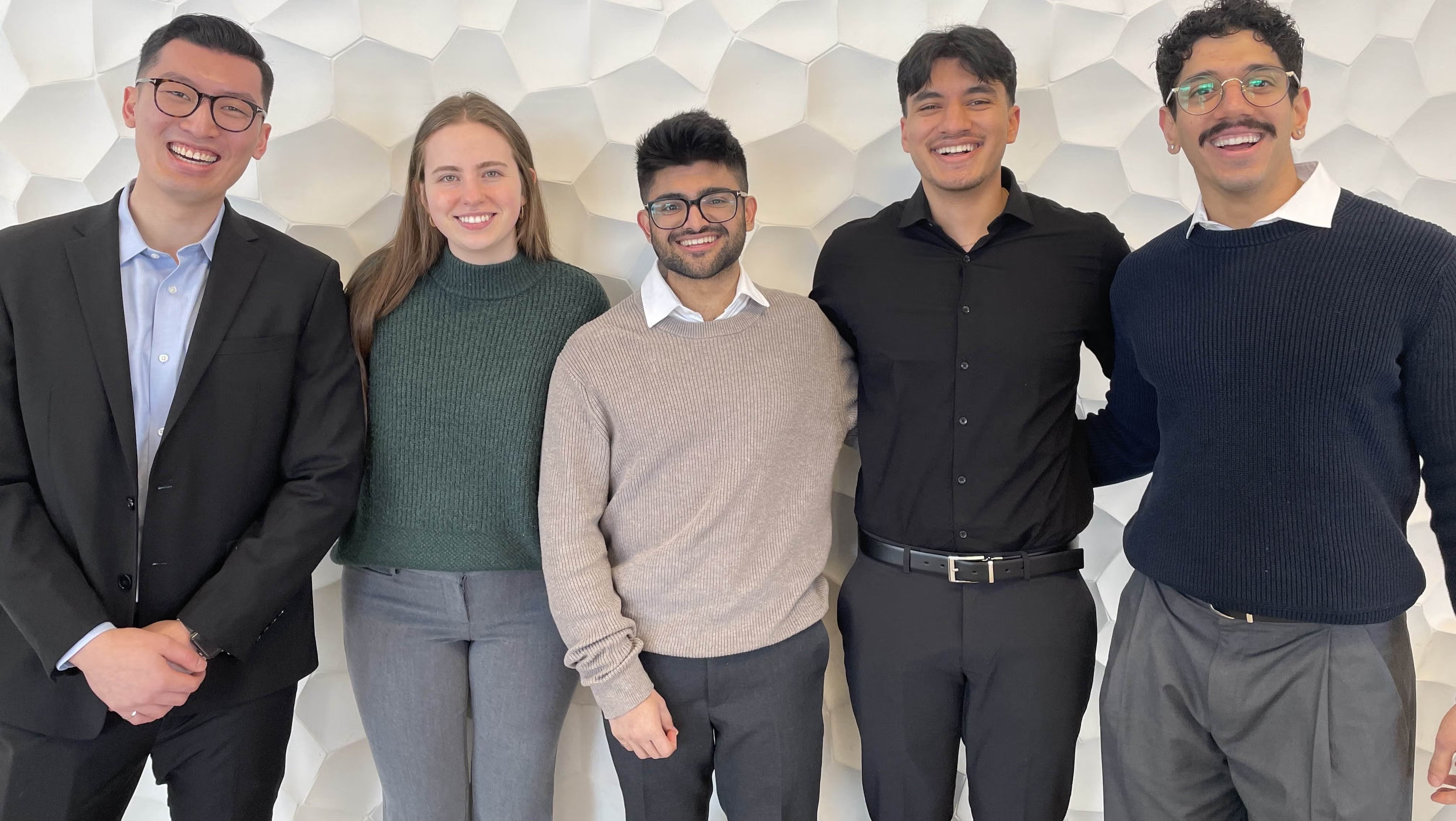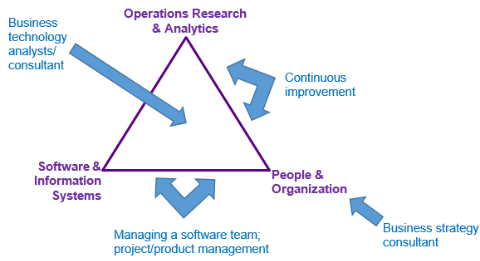Why Management Engineering?
Optimize operations: cut surgery waiting times, streamline supply chains, or fine-tune airline routes. Build advanced models to draw insights from big data. Manage the launch of new software products. Make data-driven business decisions as an engineer.
This multidisciplinary program focuses on optimizing complex processes, systems and organizations through a combination of engineering, mathematics and business courses. You'll gain expertise in areas such as operations research, data analytics, supply chain management and information systems. Graduates are equipped with the skills to enhance organizational efficiency and innovation, making them ideal candidates for roles in consulting, project management, data analysis and beyond.
Courses in Management Engineering
You’ll take a mix of foundational engineering, computer programming, mathematics, natural sciences and communications courses in first year. After first year, most of your classes will be Management Engineering courses covering topics such as machine learning, optimization, software development, simulation, organizational design, operations management and user experience design.
Sample first-year courses
This is a sample schedule. Courses are subject to change.
| Fall Term (September to December) | Winter Term (January to April) |
|---|---|
Upper year courses
For information about courses past your first year, check out the Undergraduate Academic Calendar.
Customize your degree with options
Options
Options are a way to provide you with a path to expand your degree and get a secondary emphasis in another subject or area. Students should decide if they are interested in taking options as they enter second year. Some available options are:
Co-op for Management Engineering students
You’ll have an unrivalled opportunity to gain paid work experience before you even graduate. We’ll help you navigate job applications, résumés, and interviews; you’ll have the added benefit of trying out different roles and/or industries to find the one that fits you while building your work experience and reinforcing your in-class learning out in the real world. It all adds up to a competitive advantage after graduation.
Starting in first year, you'll normally alternate between school and work every four months, integrating your classroom learning with real-world experience. You can return to the same employer for a couple of work terms to gain greater knowledge and responsibility or work for different employers to get a broad range of experience.
| Year | September to December (Fall) | January to April (Winter) | May to August (Spring) |
|---|---|---|---|
| First | Study | Study | Co-op |
| Second | Study | Co-op | Study |
| Third | Co-op | Study | Co-op |
| Fourth | Study | Co-op | Co-op |
| Fifth | Study | Study | - |
Your first work term will be at the end of first year. Learn more about co-op.
Example co-op positions for Management Engineering students
- Business analyst
- Product manager
- Data scientist
- Supply chain analyst
- Business systems analyst
- SQL application developer
- Full-stack developer
- Technical program manager intern
The pivot from web developer to stock trading
Stefan Zivkovic, Management Engineering student
Stefan shares his co-op experiences and how he went from a web developer to stock trading in two years.
He shared that "throughout my co-op journey, my entire philosophy was to take advantage of all the opportunities and try as many things as possible, and I did just that. I wanted to try a job in tech, finance and product management".
Continuing to say that, "Management Engineering co-op is a great program, I truly enjoy it! My peers and I love having the freedom to explore various opportunities each co-op term and will usually end up having very different co-op experiences. For example, some go into tech, some do product management and others go into finance and a variety of fields in between".

Example careers for Management Engineering graduates
- Product manager
- Engineering program manager
- Data analyst
- Data scientist
- Software development engineer
- Software developer, lead
- Supply chain analyst
- Technical consultant
- Data analytics consultant
Capstone design projects in Management Engineering
Capstone Design is the culmination of the engineering undergraduate student experience, creating a blueprint for innovation in engineering design.
Supported by numerous awards, Capstone Design provides Waterloo Engineering students with the unique opportunity to conceptualize and design a project related to their chosen discipline.
A requirement for completion of their degrees, Capstone Design challenges students teams to push their own boundaries, and apply the knowledge and skills learned in the classroom and on co-op work terms. It reinforces the concepts of teamwork, project management, research and development.
For a full list of previous capstone design projects, see our Capstone Design website.
Uber Ads (Capstone 2025)

Nadia Bisek, Chloe Choi, Serena Pang, Yashvi Parmar, Esha Shah
Advertisers invest millions into capturing new customers and elevating brand presence. Strategic ad placements on high-traffic platforms like Uber and Uber Eats can unlock growth for businesses and propel emerging businesses. Our team is partnering with Uber to build an innovative advertising management tool, designed for transparency and smarter predictive planning, to enhance their decision making process. Our ultimate goal is to revolutionize Uber’s advertiser management process, making it more seamless and efficient.
ORchestrate (Capstone 2025)

Matthew Chan, Adel Pazoki, Aniq Premji, Sunischit Thapa, Larissa Troper
Wait times for elective patient surgeries have increased by nearly 200% since 1993, affecting patient quality of life and placing a strain on hospitals. Many hospitals perform patient scheduling non-analytically, relying on expertise rather than a data-driven approach. ORchestrate uses Mixed-Integer-Programming, heuristics, and simulation to optimize hospitals' block scheduling frameworks. Using Cambridge Memorial Hospital data and processes, we consider patient priorities and surgical types to minimize wait times. ORchestrate generates and evaluates master surgical schedules to better inform patient scheduling decisions.
Student design teams
The Sedra Student Design Centre consists of over 20,000 square feet of space dedicated to design teams and student projects. There are more than two dozen design teams, all of which are student-led, and many of which represent Waterloo internationally.
Some examples include:
Industry 4.0

The Industry 4.0 design team is focused on promoting the unique Management Engineering program offered here at the University. Our team designs and organizes an "industry 4.0"-theme competition for high school students across the country to participate in and learn about these concepts in a fun and engaging manner.
IISE

IISE is the world's largest professional society dedicated to the support of the industrial & systems engineering profession and individuals involved with improving quality and productivity. The UWaterloo IISE Chapter has since gone on to provide countless opportunities and services for students to reach their full potential.
Wat Street

Wat Street is a student-run Design Team that strives to provide students with a comprehensive education in the fields of financial investment strategies and algorithm development. The team's primary goal is to create a space where students can learn the fundamentals of quantitative analysis and how to apply them in real-world situations.
Management Engineering alumni
Amy Tai
Amy Tai, an alumna, describes her data science experience at Microsoft.
Helen Jiang
Helen Jiang, an alumna, describes her experience in her career as a product manager.
Rhea Philip
Rhea Philip, an alumna, describes her career in consulting.







